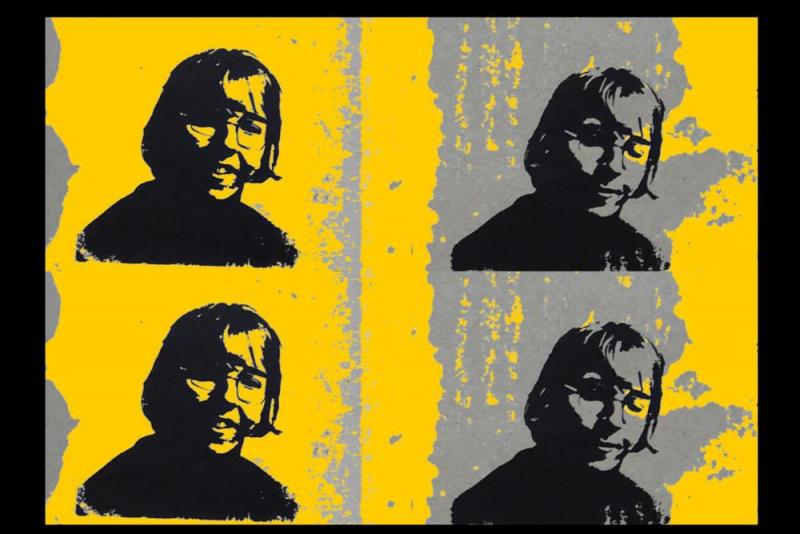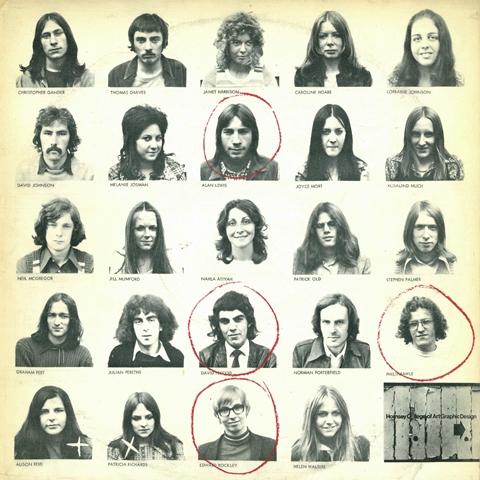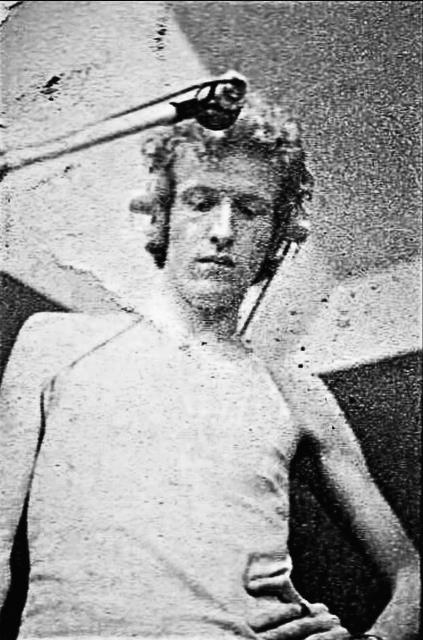Music Reissues Weekly: Bowes Road Band - Back in the HCA | reviews, news & interviews
Music Reissues Weekly: Bowes Road Band - Back in the HCA
Music Reissues Weekly: Bowes Road Band - Back in the HCA
Delightful but previously unknown early Seventies British art-school album

The acronym “HCA” in the title stands for Hornsey College of Art, the North London college which, in late May 1968, was occupied by its students and a few staff in a high-profile protest which went on into that July. What was wanted were changes in how student union funds were disbursed and how the college was run. Ultimately, barbed wire and dogs were employed to end the dispute.
Earlier, future Kink and neighbourhood resident Ray Davies had been a student there. Seventies pop star Lynsey De Paul also studied at the college. In November 1966, Pink Floyd played there with lighting equipment devised by the Light and Sound Workshop, part of the HCA’s Advanced Studies Group. The mechanical artist Bruce Lacey, there in the late 1940s, kept his ties with the college after leaving – he was celebrated in song by local band Fairport Convention.
 Later, after the HCA was absorbed into Middlesex Polytechnic, attendees included a significant amount of students who became integral to the punk and post-punk era: Viv Albertine (The Slits), Graham Lewis (Wire), designer Neville Brody, Stuart Goddard (the future Adam Ant), Gina Birch and Ana da Silva (The Raincoats).
Later, after the HCA was absorbed into Middlesex Polytechnic, attendees included a significant amount of students who became integral to the punk and post-punk era: Viv Albertine (The Slits), Graham Lewis (Wire), designer Neville Brody, Stuart Goddard (the future Adam Ant), Gina Birch and Ana da Silva (The Raincoats).
Missing from this pop-cultural roll call is music generated by anyone while they were attending the college. Now, Back in the HCA, the previously unknown 1973 album by the Bowes Road Band has been reissued to plug the gap. The street in question is north of Hornsey – the HCA was spread across multiple sites. Part of the Fine Art department was housed there in an old school. In 1972, four graphic design students came together to make an album with no intention of playing live. It was recorded between January and July 1973 at Waverley House in Crouch End, home of the college’s Co-ordinated Studies recording studio. Once it was completed, 50 copies were pressed. Making the album was an exercise.
And that was it – copies went to band members or were given away. The Bowes Road Band’s album was unheard of, undiscovered by collectors. This changed when a copy turned up at a Berlin flea market. The band members were then sought out and it was found that synthesiser and woodwind player Ted Rockley had the master tape in his attic. Hence the reissue.
 As an album which was unknown rather than obscure, its reappearance from oblivion is a welcome surprise. Even if had been heard of and had become a collector’s staple, it would still be notable. What Rockley, Alan Lewis (drums, vocals), Dave Pescod (vocals, acoustic electric and guitars) and Phil Rawle (bass guitar, lead guitar, vocals) were responsible for (sundry other HCA students helped out on other instruments) is a delightful example of lightly jazz flavoured early Seventies British art-rock hinting at Kevin Ayers and The Kinks, with leanings towards a baroque folk rock. The reissue does not, though, tell the full story: it is of six tracks from the original album rather than the whole thing. Three cuts are not heard as, according to the press release, the label “decided to mine the six most cohesive tracks for the reissue.” Isn’t this strange rewriting of history unnecessary? Surely listeners can determine what's good for themselves. (pictured left, Bowes Road Band's Phil Rawle during the recording of Back in the HCA)
As an album which was unknown rather than obscure, its reappearance from oblivion is a welcome surprise. Even if had been heard of and had become a collector’s staple, it would still be notable. What Rockley, Alan Lewis (drums, vocals), Dave Pescod (vocals, acoustic electric and guitars) and Phil Rawle (bass guitar, lead guitar, vocals) were responsible for (sundry other HCA students helped out on other instruments) is a delightful example of lightly jazz flavoured early Seventies British art-rock hinting at Kevin Ayers and The Kinks, with leanings towards a baroque folk rock. The reissue does not, though, tell the full story: it is of six tracks from the original album rather than the whole thing. Three cuts are not heard as, according to the press release, the label “decided to mine the six most cohesive tracks for the reissue.” Isn’t this strange rewriting of history unnecessary? Surely listeners can determine what's good for themselves. (pictured left, Bowes Road Band's Phil Rawle during the recording of Back in the HCA)
Nonetheless, what’s here in a reproduction of the original sleeve is wonderful. Sonically, the production is professionally pin sharp. The new Back in the HCA begins with “Grass is Grass,” which has a melodic similarity with Crosby, Stills, Nash & Young’s “Woodstock.” This warm though autumnal song is jazzy, pastoral and lilting. There’s a hint of Donovan. Next, the equally assured, misty, psychedelia-edged “Tomorrow’s Truth.” The song has odd snatches of backwards drums and white-noise synthesiser swoops. Third and last on Side One is “Goodbye to Rosie,” on which a Ray Davies introspection cosies-up to Honeybus. Side Two is as great: especially the gently freaky, Ray Davies-evoking “Doctor Doctor.” Back in 1973, Bowes Road Band would have fitted snugly into the rosters of the Island or Virgin labels. But once the album was recorded and pressed, there was no intention of doing anything further. Oblivion beckoned.
A whopping 50 years on, this transient, previously forgotten band finally gets its day in the sun. Furthermore, the reissue of Bowes Road Band’s exceptional Back in the HCA enhances Hornsey College of Art’s status as a pop-cultural hothouse.
- Next week: The return of Pale Saints' enigmatic 1992 album In Ribbons
- More reissue reviews on theartsdesk
- Kieron Tyler’s website
Explore topics
Share this article
The future of Arts Journalism
You can stop theartsdesk.com closing!
We urgently need financing to survive. Our fundraising drive has thus far raised £49,000 but we need to reach £100,000 or we will be forced to close. Please contribute here: https://gofund.me/c3f6033d
And if you can forward this information to anyone who might assist, we’d be grateful.

Subscribe to theartsdesk.com
Thank you for continuing to read our work on theartsdesk.com. For unlimited access to every article in its entirety, including our archive of more than 15,000 pieces, we're asking for £5 per month or £40 per year. We feel it's a very good deal, and hope you do too.
To take a subscription now simply click here.
And if you're looking for that extra gift for a friend or family member, why not treat them to a theartsdesk.com gift subscription?
more New music
 The Last Dinner Party's 'From the Pyre' is as enjoyable as it is over-the-top
Musically sophisticated five-piece ramp up the excesses but remain contagiously pop
The Last Dinner Party's 'From the Pyre' is as enjoyable as it is over-the-top
Musically sophisticated five-piece ramp up the excesses but remain contagiously pop
 Moroccan Gnawa comes to Manhattan with 'Saha Gnawa'
Trance and tradition meet Afrofuturism in Manhattan
Moroccan Gnawa comes to Manhattan with 'Saha Gnawa'
Trance and tradition meet Afrofuturism in Manhattan
 Soulwax’s 'All Systems Are Lying' lays down some tasty yet gritty electro-pop
Belgian dancefloor veterans return to the fray with a dark, pop-orientated sound
Soulwax’s 'All Systems Are Lying' lays down some tasty yet gritty electro-pop
Belgian dancefloor veterans return to the fray with a dark, pop-orientated sound
 Music Reissues Weekly: Marc and the Mambas - Three Black Nights Of Little Black Bites
When Marc Almond took time out from Soft Cell
Music Reissues Weekly: Marc and the Mambas - Three Black Nights Of Little Black Bites
When Marc Almond took time out from Soft Cell
 Album: Mobb Deep - Infinite
A solid tribute to a legendary history
Album: Mobb Deep - Infinite
A solid tribute to a legendary history
 Album: Boz Scaggs - Detour
Smooth and soulful standards from an old pro
Album: Boz Scaggs - Detour
Smooth and soulful standards from an old pro
 Emily A. Sprague realises a Japanese dream on 'Cloud Time'
A set of live improvisations that drift in and out of real beauty
Emily A. Sprague realises a Japanese dream on 'Cloud Time'
A set of live improvisations that drift in and out of real beauty
 Trio Da Kali, Milton Court review - Mali masters make the ancient new
Three supreme musicians from Bamako in transcendent mood
Trio Da Kali, Milton Court review - Mali masters make the ancient new
Three supreme musicians from Bamako in transcendent mood
 Hollie Cook's 'Shy Girl' isn't heavyweight but has a summery reggae lilt
Tropical-tinted downtempo pop that's likeable if uneventful
Hollie Cook's 'Shy Girl' isn't heavyweight but has a summery reggae lilt
Tropical-tinted downtempo pop that's likeable if uneventful
 Pop Will Eat Itself's 'Delete Everything' is noisy but patchy
Despite unlovely production, the Eighties/Nineties unit retain rowdy ebullience
Pop Will Eat Itself's 'Delete Everything' is noisy but patchy
Despite unlovely production, the Eighties/Nineties unit retain rowdy ebullience
 Music Reissues Weekly: The Earlies - These Were The Earlies
Lancashire and Texas unite to fashion a 2004 landmark of modern psychedelia
Music Reissues Weekly: The Earlies - These Were The Earlies
Lancashire and Texas unite to fashion a 2004 landmark of modern psychedelia

Add comment